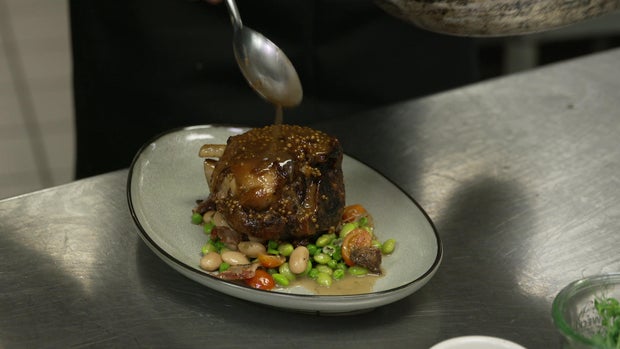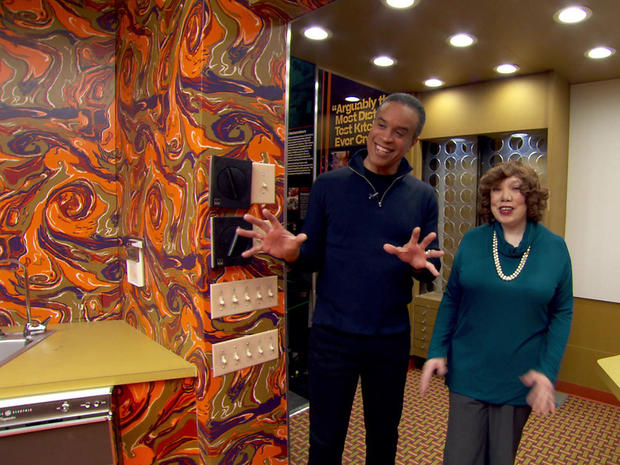Redefining soul food and the history of American cuisine
[ad_1]
You in all probability have not experienced pork and beans like this, with edamame and tomatoes. And how’s this for a centerpiece: “This huge mamma, which is our Berkshire pork shank,” reported chef Chris Williams.
Correspondent Maurice DuBois questioned, “When you mentioned pork and beans, this is literally not what we had been picturing.”
CBS Information
“When we initially opened, we sort of understood what people’s anticipations would be on what we were gonna do,” reported Williams. “Black-owned restaurant, you are expecting pork and beans, you might be expecting this, and so we enable that get them in the doors, and then present ’em this variety of things.”
At Williams’ Houston cafe Lucille’s, every little thing from the shrimp and grits to the braised oxtail has an unexpected twist – an solution he calls “nicely-refined Southern cuisine.”
DuBois questioned, “Are you changing the perception of soul meals?”
“The goal here is to improve the constrained framing of African American chefs though having to pay homage to our roots,” he replied.
Williams reported the idea of redefining what it implies to be a Black chef is wound in his DNA, thanks to his excellent-grandmother, the famous chef, educator and entrepreneur Lucille B. Smith.
Williams stated, “She produced the country’s 1st prompt warm roll blend. Iterations of that scorching roll dough, which were being like these chili biscuits proper here, have been served to American Airways, their initial-class travellers. She, like, broke by way of the shade lines with the brilliance of her product.”
Smith is one of much more than 400 Black culinary influencers showcased in a new Museum of Food items and Drink exhibit called “African/American: Building the Nation’s Desk.” It opened lately in New York Town at the Africa Centre.
Culinary historian Jessica B. Harris is the guide curator. “We are beginning, and regrettably only commencing, to fully grasp the enormous, amazing hand that African People in america have experienced in the cooking pots of America,” she claimed.
DuBois asked, “You say that it is a lot more American that apple pie, this African American cooking?”
“It is,” Harris replied. “it has been here. it has been the backbeat. It has been the thrum, the hum, and the heartbeat of unquestionably significantly of this place.”
Harris claimed enslaved Africans introduced to America assisted gasoline an agricultural revolution: “They planted the crops. They tended the crops. They harvested the crops. They then cooked that, served that. And you might be doing all of that for the founding fathers. You are undertaking all of that for the elite of the place that is commencing to establish what this country’s meals and meals ways are.”
Harris famous that the fledging American colony’s prosperity was established by African fingers. DuBois requested, “You think which is been acknowledged?”
“It is that factor which is tough to confess,” she replied.
CBS Information
At the heart of the exhibit hangs a substantial Legacy Quilt, every single block handcrafted to notify a tale, which include that of inventor Frederick McKinley Jones, who manufactured contemporary foods accessible to millions. “He arrived up with an invention that allowed us to have refrigerated vehicles,” explained Harris.
And James Hemings, Thomas Jefferson’s enslaved chef, who apprenticed in Paris and introduced again copper pots, between other issues. “Which is how we get that mac ‘n’ cheese,” Harris reported.
And you can find Nearest Inexperienced, the previously enslaved guy behind Jack Daniels whiskey: “We believed that Jack Daniels was Jack Daniels, only finding he was taught to distill by Closest Inexperienced.”
Also on exhibit: the famed Ebony exam kitchen. For pretty much fifty percent a century it sat at the middle of Black American meals tradition. It was generally highlighted in Ebony Magazine’s cooking column as they tried out out new recipes.
Touring the show, DuBois remarked, “The hues just strike you. They are a little loud!”
CBS Information
“It is really vibrant, and shows the range of the African American viewers,” reported Charla Draper, who was the magazine’s meals editor and worked in the kitchen in the 1980s. “Ebony was produced as an aspirational magazine to clearly show, ‘You can do these items. You can go to regulation faculty, you can develop into a noteworthy entertainer, and you can develop into certainly a good prepare dinner.'”
Breaking bread has a way of breaking down boundaries. It’s a fitting reminder that chef Chris Williams hopes will provide us with each other
“Everybody has excellent reminiscences of, like, these smells and sensations from again when they have been young children,” he explained. “It won’t matter who you are. We can just have a excellent encounter in the most sudden sites and uncover typical floor.”
CBS News
For far more information:
Story produced by Robbyn McFadden. Editor: Carol Ross.
[ad_2]
Supply hyperlink




